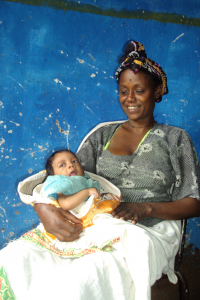Bekelu, lives in Dankaka kebele, East Shoa Zone, Oromia Region in Ethiopia and has eight children. In her last pregnancy, she did everything that the health extension workers advised including attending all antenatal visits at the nearby health center and health post and giving birth at Dankaka Health Center.

Her newborn son, Bereket, was doing well until he got sick in his fourth week. He cried a lot, refused to breastfeed and vomited persistently. Thanks to the information she received from health extension workers implementing the Community Based Newborn Care package, Bekelu recognized that these were danger signs and took action.
“I immediately contacted Genet, a health extension worker who lives close to my home,” she said. “I did not use any traditional medicine on Bereket as I had with his older siblings. I did not have any fear of the hamechisa[1] because I knew that the consequences of these danger signs could kill my baby.”
Genet examined Bereket and diagnosed his condition as “very severe disease.” She advised Bekelu to take him to the nearby health center. However, Bekelu had to stay at home to take care of her other seven children and decided not to follow-up on the referral.
In such situations, the Community Based Newborn Care guidelines recommend treatment at home or at the health post. Accordingly, Genet began to manage Bereket’s case at home and put him on a seven-day course of antibiotics in line with the national treatment protocol. She was very happy to see Bereket improve during subsequent follow up visits.
Bereket is now healthy and smiling again. Bekalu says, “I am very happy my child is alive and thankful he was able to get treatment at home.”
About 3 million babies are born in Ethiopia each year, around 74 percent of them at home. The 2016 Ethiopia Demographic and Health Survey reports that newborn mortality rate is 29 per 1,000 live births; a rate that has stayed steady over the past 10–15 years. Newborn mortality accounts for 43 percent of all under-five mortality. To help improve these numbers, the Government of Ethiopia is implementing Community Based Newborn Care, strengthening the Primary Health Care Unit and Health Extension Program. Save the Children’s Saving Newborn Lives project is playing a catalytic role to support the government’s efforts to scale up Community Based Newborn Care by working to increase demand for and capacity of health extension workers. Effectiveness and scale up of the Community Based Newborn Care Package requires a demand-creation strategy to improve health seeking behavior and health service uptake. If implemented and adopted by communities at scale, Community Based Newborn Care has the potential to greatly reduce newborn deaths in Ethiopia.
Community Based Newborn Care supports communities by providing appropriate knowledge on newborn health, including danger signs such as the ones Bekelu experienced. If implemented and adopted by communities at scale, Community Based Newborn Care has the potential to greatly reduce newborn deaths in Ethiopia.
By Dagne Fekadu, Save the Children Ethiopia.